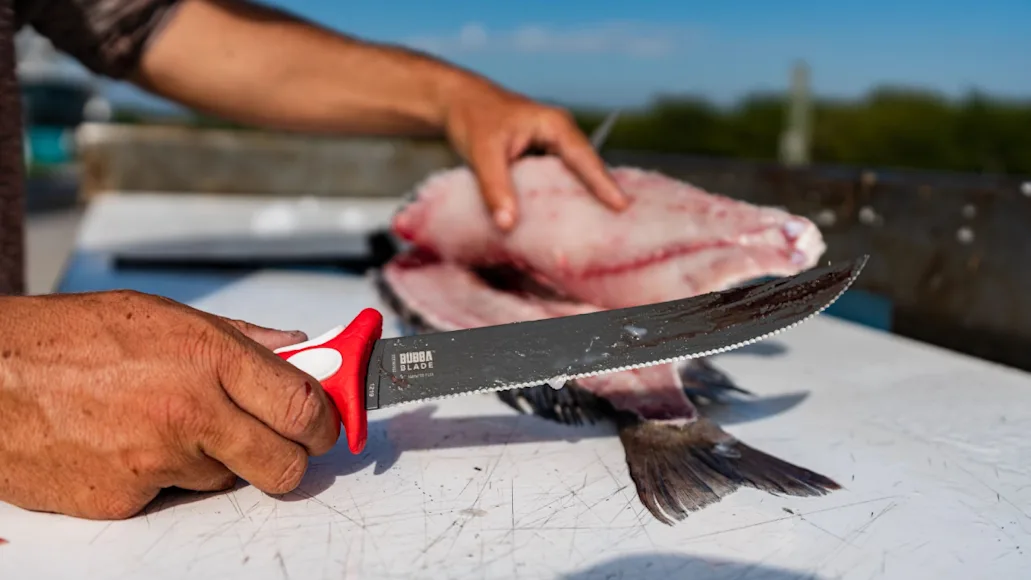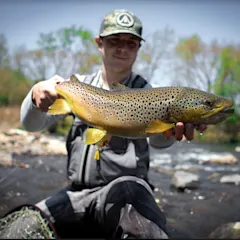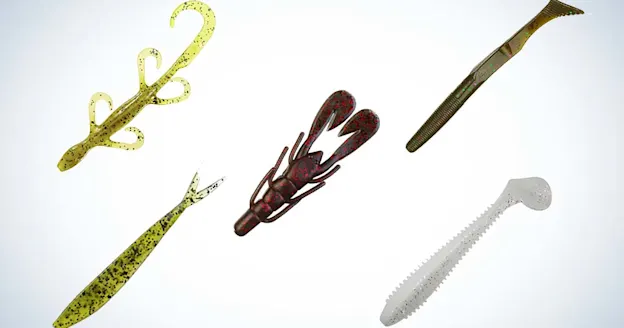_We may earn revenue from the products available on this page and participate in affiliate programs. Learn more ›
_
Best Overall

Benchmade Grizzly Creek
LEARN MORE
Summary
A great all-around fishing knife with a gut hook for cleaning fish on the water.
Best Saltwater
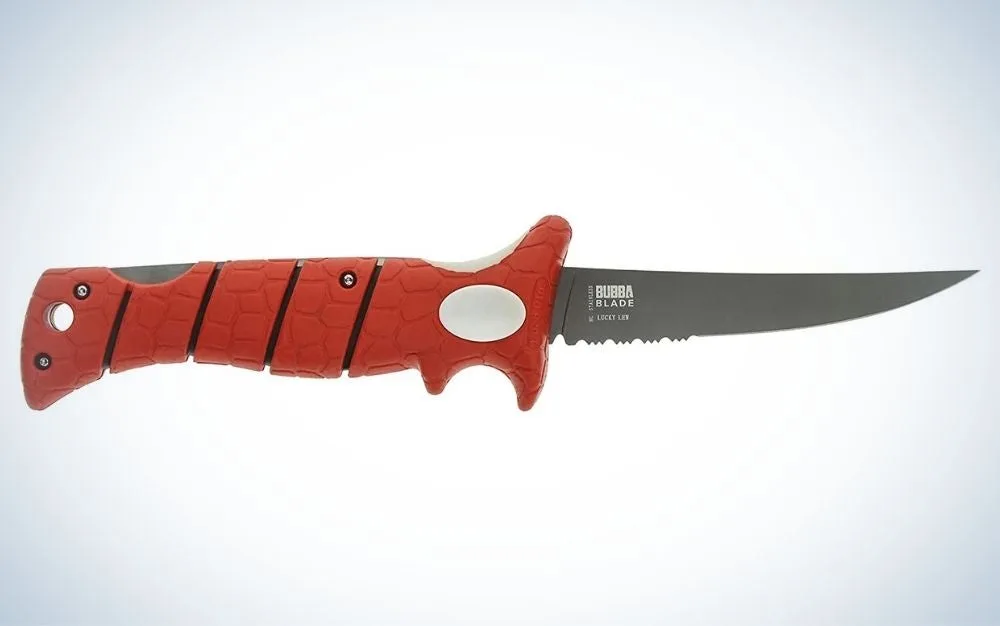
Bubba 5-inch Lucky Lew Folding Knife
LEARN MORE
Summary
From cutting bait to filleting fish, this is a do-it-all knife for saltwater anglers.
Best Electric Fillet

Bubba Pro Series Cordless Electric Fillet Knife
LEARN MORE
Summary
Sharp and fast—two words that are crucial when cleaning fish in a timely manner.
The best fishing knife should be sharp, versatile, and reliable. Anglers fish in different places, with different techniques. But no matter where or how you fish, every fisherman needs a good knife. Like fishing rods and reels, there are an infinite number of knives to choose from. Think carefully about the conditions you face, what you need your knife to do, and a few key features before making a selection. I took the time to weed through an array of knives to find the best fit for any angler.
Best Overall: Benchmade Grizzly Creek
Best for Saltwater: Bubba 5″ Lucky Lew Folding Knife
Best Fishing Machete: Gerber Double Down Folding Machete
Best Fishing Pocket Knife: True Utility Replaceable Blade Folding Knife
Best Electric Fillet Knife: Bubba Pro Series Cordless Electric Fillet Knife
Best Budget: Rapala 6″ Fish’n Fillet Knife
How We Picked The Best Fishing Knives
As an avid angler and hunter, I’ve learned a lot about knives over the years. Hunting taught me the versatility of a good knife and it quickly transitioned to fishing. They all serve a purpose and can make your time fishing much more enjoyable. You wouldn’t use a hammer to drive in a screw just like a fillet knife wouldn’t work to cut through the brush. Finding a knife that works for what you do is the first step in the right direction. Once you narrow that down, consider feel and construction and you’ll be happy with your decision.
As a fisheries biologist
, I am constantly on a boat and in the field. Knives are one of the most important tools I use on a daily basis. I’ve watched knives rust in a matter of minutes and through trial and error, I’ve learned what works and what doesn’t. Here are the criteria I look for when I’m choosing a knife for my fishing adventures:
Price: Is the knife worth the price tag?
Size: How big is the overall knife and is it convenient for fishing?
Blade Length: How long is the blade and what purpose suits it best?
Materials: What are the handle and blade made of, and how durable is it?
Safety: How safe is it to use and what locking mechanism, if any, does it have?
Fixed or Folding: Is the knife fixed blade or folding and how does that affect usability?
Best Fishing Knives: Reviews & Recommendations
Best Overall: Benchmade Grizzly Creek
Best Overall

Specs
Weight: 4.76 oz
Blade Length: 3.5 inches
Knife Type: Folding
Pros
Lightweight
Comfortable in the hand
Built-in gut hook
Cons
Expensive
Anglers have a knack for acquiring gear. I’ve recently been trying to take the minimalist route and be more organized which includes a do-it-all knife. A good all-around knife needs to be sharp, durable, and above all, versatile. Enter the Benchmade Grizzly Creek, built on a traditional folding knife platform—like so many of the best Benchmade knives
, it’s the perfect size to carry all day. It comes from the factory shaving sharp and is built out of CPM-S30V. I can go months without sharpening it and still use it daily. The steel is also incredibly corrosion-resistant, so if it gets wet you don’t have to worry about rust developing quickly.
For a fishing knife, the foldable gut hook is a great accessory to have. It makes quick work of gutting fish like trout and perch and also works well to cut line. Simply fold the line over the hook and pull. The 3.5-inch blade is a good length for everyday carry so you can use it whether you are on or off the water.
Best for Saltwater: Bubba 5-inch Lucky Lew Folding Knife
Best Saltwater

Specs
Weight: 7.1 oz
Blade Length: 5 inches
Knife Type: Folding
Pros
Folding design for easy storage
Titanium-Nitride coating for corrosion resistance
Rubberized handle to prevent slipping
Cons
Folding release takes a little to break-in
Saltwater fishing opens up new opportunities for several species of fish. Unfortunately, the salt can be brutal on gear, especially knives. It is constantly a losing battle fighting off the salt from corroding rods, reels, hooks, and knives. The Bubba Lucky Lew Folding Knife helps fix this problem. Finished with a titanium-nitride coating—it is essentially rustproof. The coating is built to withstand anything you throw at it and hold up for years of fishing adventures. Designed with a 5-inch folding blade, it is a great all-around knife. While the blade design is similar to a traditional fillet knife, several key features make it an all-around workhorse.
The serrated edge on the backend of the blade is great for cutting through tough fish skin when needed. This knife has a permanent spot on my boat and the collapsable blade helps with saving space. It works well as a bait knife and cuts through scales easily. The knife taper also serves well for finesse work on small fish to get the most out of the fillets.
Best Fishing Machete: Gerber Double Down Folding Machete
Best Fishing Machete
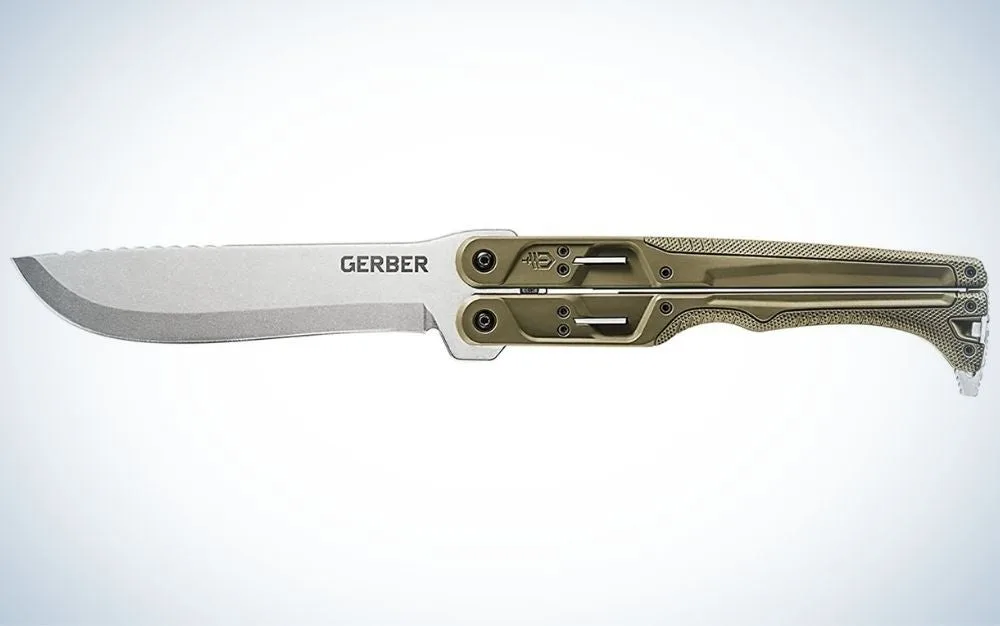
Specs
Weight: 1.12 pounds
Blade Length: 6.75 inches
Knife Type: Folding
Pros
Foldable and compact
Comfortable grip
Do-it-all size blade
Cons
Just over a pound
It seems the biggest fish are always in the hardest-to-reach places. For shore anglers, especially, it can be hard to reach these locations. They are usually overgrown and difficult to navigate, but with the right knife, getting there can be worth it. The Gerber Double Down Machete is one of the first foldable machetes and the perfect tool for land-based anglers. As a fly fisherman, I constantly find myself trudging through thick vegetation and thorns to get to a good-looking spot. I like to pack light, so traditional machete-style knives are out of the question. The Double Down Machete is perfect to fold up and put in a backpack.
The blade is 6.75 inches long, a good length for most chopping while still usable in close-up situations. It features a comfortable grip so you can swing it without the worry of slipping and a Quadlock system to make sure it doesn’t come unfolded. I’ve been thoroughly impressed with the compact and durable design.
Best Fishing Pocket Knife: True Utility Replaceable Blade Folding Knife
Best Fishing Pocket Knife
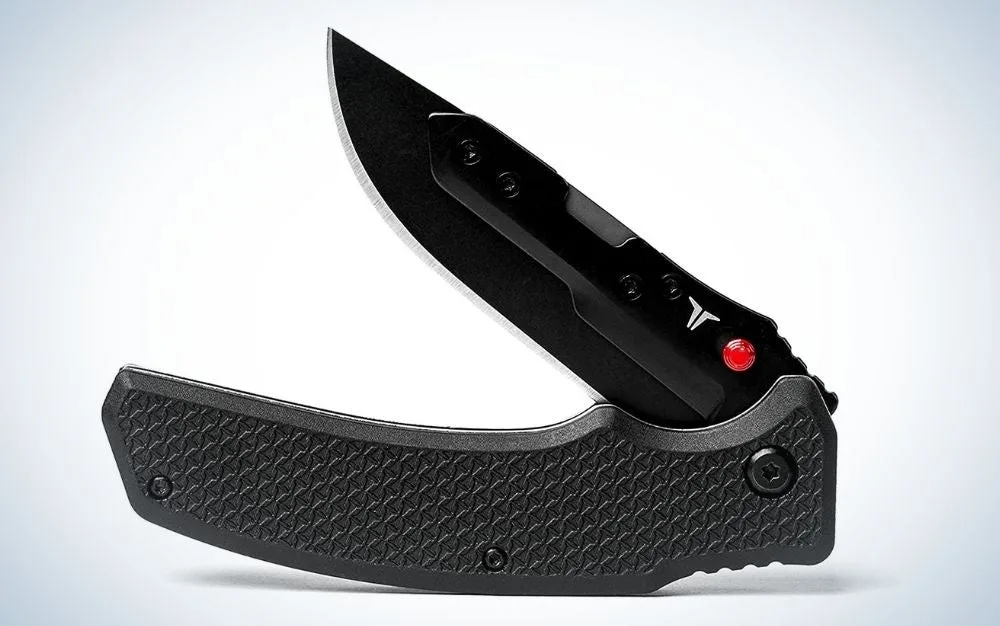
Specs
Weight: 6.5 oz
Blade Length: 3.5 inches
Knife Type: Folding
Pros
Replaceable blades
Two-step blade release
Multiple types of blades
Cons
On the heavier side
Rarely do I find the time to sit down and sharpen my knives when I’m busy tying flies or standing in a river. The True Utility Replaceable Blade Folding Knife is the perfect solution to always have a sharp blade ready to go. This technology was popularized by the hunting world for skinning, but True took it one step further with a versatile folding knife. The blades come razor-sharp and are easy to replace with a two-step locking system. The thin blade diameter cuts through things with ease and can double as a great fillet knife in a pinch. They are surprisingly durable and if you do manage to bend or break one, simply switch it out for a new blade.
What is most impressive about this system is the different blade offerings. With this versatility, you can turn one tool into multiple. Switch the knife out for the saw blade and you cut through just about anything. It’s small enough to fit in a pocket while still keeping 3.5 inches of usable blade length. For anglers who never know what they will need, it is a great pocket knife
to ensure you always have a sharp and versatile knife on hand.
Best Electric Fillet Knife: Bubba Pro Series Cordless Electric Fillet Knife
Best Electric Fillet Knife

Specs
Weight: 1.11 pounds
Blade Length: 7-inch, 9-inch, and 12-inch blades
Knife Type: Fixed electric
Pros
Four blade options
Easy-to-use
Built-in trigger safety
Cons
Don’t forget to charge the batteries
The Bubba Pro Series Cordless Electric Fillet Knife is the best fillet knife for cleaning fish fast. It comes with four different blade options ranging from seven to twelve inches. The shorter blades work great on smaller fish while the bigger blades allow you to make deep cuts on larger fish. The knife is battery operated and comes with two batteries so you can always have a backup charged. On larger fish, the battery feature is crucial so you can bring the knife to the fish instead of relying on the closet outlet.
My biggest concern with electric fillet knives
is safety, but Bubba addressed this with a built-in trigger safety. The blades also lock in with a button release to ensure they won’t be going anywhere. Even on triggerfish, known for their hard skin, I have had no issues cleaning them quickly and efficiently. While it may be an investment, the time the Bubba Pro Series Cordless Fillet Knife saves you more in the long run.
Best Budget: Rapala 6″ Fish’n Fillet Knife

Specs
Weight: 6.72 ounces
Blade Length: 6-inch, 4-inch
Knife Type: Fixed
Pros
Affordable
Stainless steel blade
Leather sheath
Easy to maneuver
Cons
Becomes dull fast
The Rapala Fish’n Fillet is a classic knife used by anglers all across the country. It comes in either a 6-inch or 4-inch stainless steel blade with a leather sheath and sharpener. It is the perfect knife to keep in your boat or tackle box. My dad carried one in his tackle box my entire childhood. We used it for everything, including cutting bait, nipping line, and filleting fish. The blade can get dull fast, but all it takes is a few passes through a sharpener, and it is good as new. It is extremely affordable, and the classic wood handle and brown leather sheath are a bonus. —Ryan Chelius
What to Consider When Choosing a Fishing Knife
Knives come in all shapes and sizes with countless options on the market. Some cost a pretty penny while others are budget-friendly. Finding the best knife for the job can be tricky especially if you go off price alone. The more expensive options don’t necessarily mean they are better. Any knife worthy of your time should be comfortable, sharp, and durable. The last thing you want is your knife failing you when you need it most. Here are a few things to consider when finding the right knife for your fishing.
Fishing Style
Perhaps the most important aspect of choosing the right fishing knife is recognizing how you plan to use it. Sure, that one knife might be catching your eye, but at the end of the day, if it doesn’t do the job, it’s worthless. If you fish with a lot of bait, a bigger blade that can double as a bait knife is a good idea. For trout fishermen, something smaller and compact might be the perfect option to fit in a vest until you need it. You also need to consider if you plan to fillet fish with the knife or use it as a utility knife to cut line and rig tackle. Knives for filleting generally have a narrow blade that makes it easy to cut through fish and maneuver to get the most meat possible.
Materials
Not all knives are created equal and the foundation starts with blade construction. Certain steels handle rough conditions much better than others and this is crucial when constantly around water. Rust is a knife’s worst enemy. Like anything, there are pros and cons to different types of steel. Some that are more corrosion resistant might not hold an edge as well, while some may hold an edge forever but are hard to sharpen. Finding a good middle ground is the best bet and steels like CPM S30V can make for great blades. Do some research and find out how to pick the best steel for your application.
Blade Edge
I remember my high school Woodshop teacher rambling on about how a dull tool is more dangerous than a sharp one. After years on the water and in the woods, I can confirm this is true. A dull knife makes it hard to cut through things leaving you more prone to slipping and injuring yourself. Make sure the knife you are looking at is sharp, especially when cutting lines and filleting fish. In addition, finding a knife that is easy to sharpen is just as crucial to maintaining an edge.
If you’re not comfortable with sharpening, several companies like Benchmade offer lifetime sharpening services when you buy the knife to ensure a razor-sharp edge for years to come. Another solution is buying replaceable blade knives. These have grown in popularity recently and can be a great way to ensure you always have a sharp blade.
Coatings and Finishes
There are countless finishes and coatings so you don’t have to buy a bare blade. Whether it be cerakoting or another coating process, plenty of knives have an added layer of protection. These coatings are great for corrosion resistance and ward off rust well. They also protect the blade from scratches to keep it looking new. If you know you’ll be putting your knife through the wringer, this is a serious consideration.
FAQs
Q: Is it legal to carry a knife when fishing?
Most pocket knives are legal to carry but it varies by state. There is usually a blade length restriction for carrying a knife so double-check with local and state laws. For larger fixed blade knives, they may only be legal to open carry meaning the knife must be in a holster and visible on your person. Make sure you do your research to determine if the knife you chose complies with the carry laws of your state.
Q: What should I look for in a fishing knife?
For general use, a three or four-inch folding knife is a great choice. If you plan on filleting fish, look for a long thin-bladed knife to easily cut through scales and meat. Electric fillet knives are even better if you plan on cleaning fish frequently. Choose your knife with a purpose in mind and you’ll be much happier with your decision.
Q: What length fillet knife is best?
The best length for a fillet knife depends on the size of fish you plan on cleaning. For small to medium-sized fish—a 6 or 7-inch knife is perfect. These blades have enough flex to work around small bones easily. Larger fish like tuna require bigger knives with less flex. A 9-inch or 12-inch knife is stiff enough to push through larger fish while still maintaining slight flex when you need it.
Q: How do you sharpen a fillet knife?
Sharpening a fillet knife is easier than it sounds. I like to use a sharpening stone in different grits to hone a knife to a razor-sharp edge. Use stones in increasing grits until you reach the desired sharpness. Stroke the blade over the stone at a 20-degree to 30-degree angle making equal passes both ways. If you want a more exact means of sharpening, the Work Sharp Precision Knife Sharpener
is a great tool. You can lock the blade at a specific angle and easily switch between sharpening grits until your knife is sharp.
Q: Should I get a curved or straight fillet knife?
Curved and straight blades can both be good for filleting fish. I like to have some flex in my fillet knives because it allows the blade to bend along the center of the fish and move when you hit a bone. This helps with getting more meat off the fish and cleaner fillets.
Best Fishing Knives: Final Thoughts
Best Overall: Benchmade Grizzly Creek
Best for Saltwater: Bubba 5-inch Lucky Lew Folding Knife
Best Fishing Machete: Gerber Double Down Folding Machete
Best Fishing Pocket Knife: True Utility Replaceable Blade Folding Knife
Best Electric Fillet Knife: Bubba Pro Series Cordless Electric Fillet Knife
Best Budget: Rapala 6″ Fish’n Fillet Knife
The best fishing knife goes a long way on the water. It can help you rig, clean fish, and even tackle some brush in a pinch. Finding one knife that can do-it-all is no easy task. Most knives do one thing better than others, so making sure you know what you need is crucial. Considering blade materials, durability, and overall usability are great starting points to find the right knife. Above all, a knife must be comfortable to use safely.
Why Trust Us
For more than 125 years, Field & Stream has been providing readers with honest and authentic coverage of outdoor gear. Our writers and editors eat, sleep, and breathe the outdoors, and that passion comes through in our product reviews. You can count on F&S to keep you up to date on the best new gear. And when we write about a product—whether it’s a bass lure or a backpack—we cover the good and the bad, so you know exactly what to expect before you decide to make a purchase.

